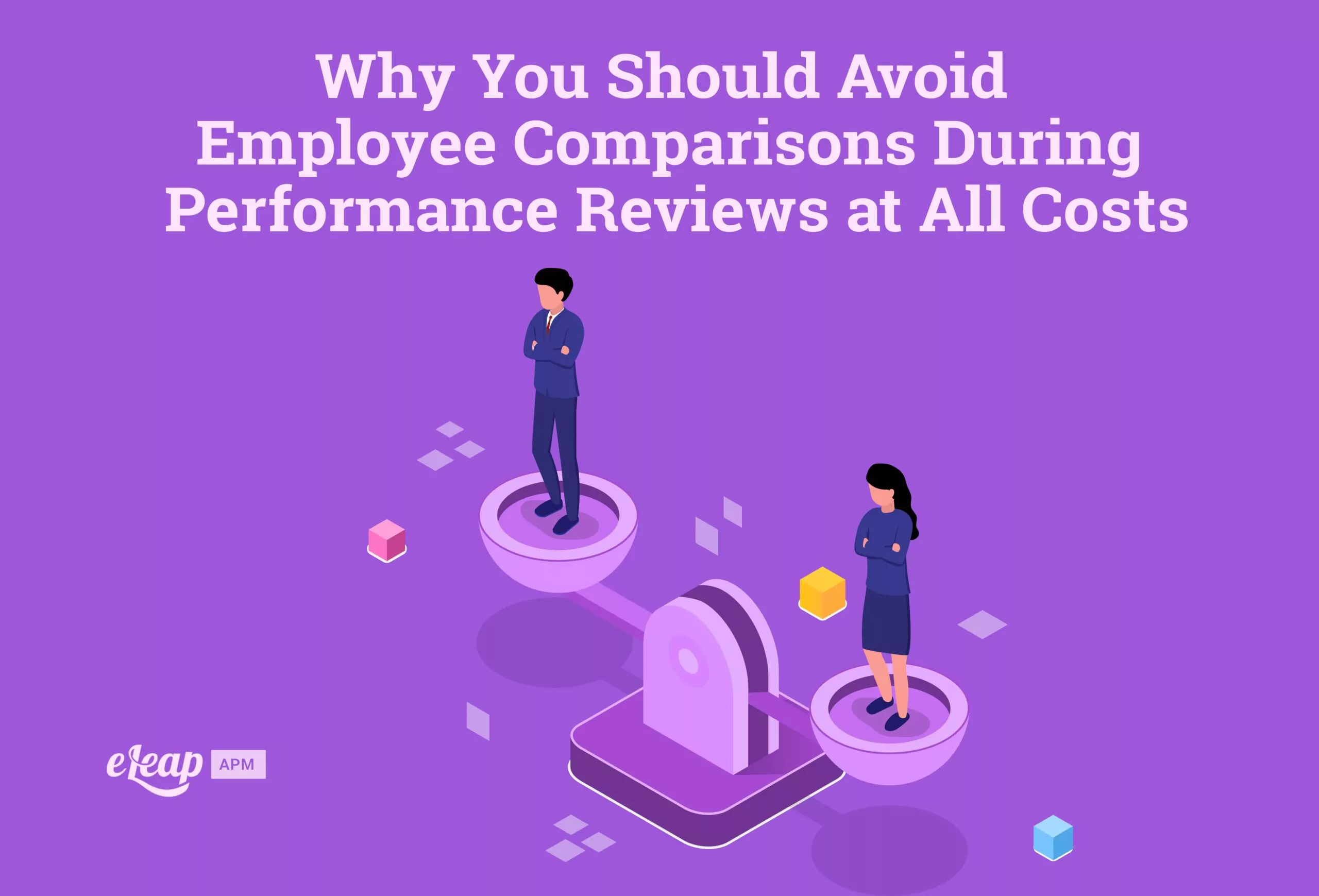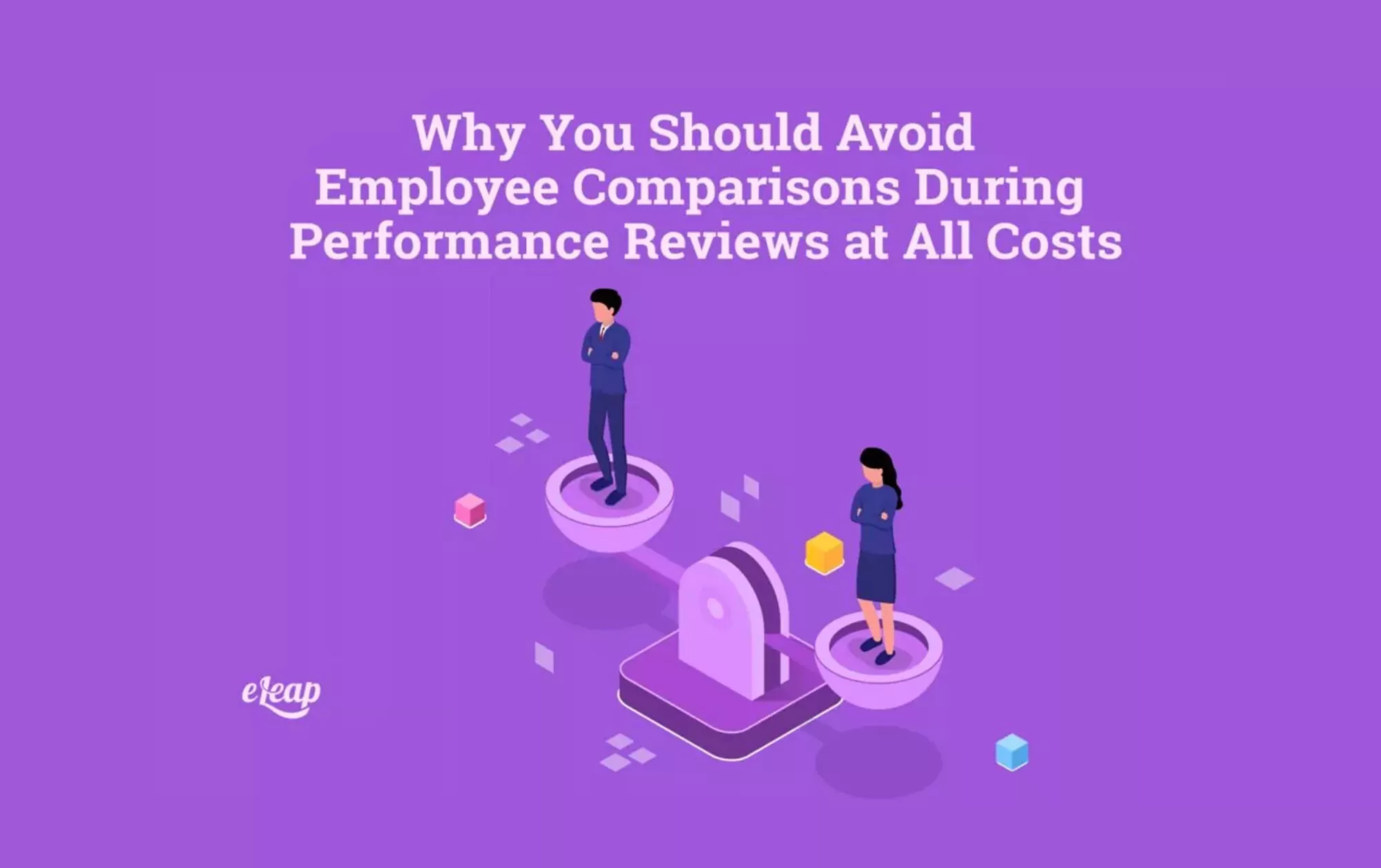Why You Should Avoid Employee Comparisons During Performance Reviews at All Costs

It’s no secret that employee performance reviews are a critical pillar of any organization’s success. Without them, it’s almost impossible to retain employees and improve your workforce in terms of growth, performance, and productivity. While they are essential, they do consume a significant amount of company resources and time. This makes it all the more important that they’re conducted effectively and have a positive impact on your company. How you conduct performance appraisals can motivate or disengage employees, depending on how they’re approached. See the quick 8-minute course “Becoming An Effective Manager: Managing Performance”. Explore how eLeaP’s Performance Management Platform can simplify evaluations, boost productivity, and drive measurable results.
Comparative performance appraisals rate an employee’s performance in a traditional fashion. Employees are compared to their peers and then ranked according to that comparison. But comparison negatively affects employee morale and can have a counterproductive effect on an organization. Here, we will discuss why avoiding comparisons in performance reviews is critical.

Comparison Ruins Confidence
When comparing an employee to others rather than focusing on them as an individual, it undermines the employees’ confidence in themselves. This causes morale to plummet and ultimately leads to a decline in productivity and the inability of an employee to reach their full potential.
Comparison Doesn’t Emphasize Strengths
Each employee is unique, with their own strengths and weaknesses. When comparing an employee to their peers, it often makes their weaknesses stand out more and puts the focus on what they aren’t doing well in comparison to others. This leads to employees constantly comparing their performance to that of their more successful peers.
Employees need to be able to play to their own strengths in order to reach their best performance potential. If employees are constantly striving to reach the same level of strength as others in certain areas, they won’t focus on what they can do best. Rankings and comparative appraisals do not take into account the uniqueness and strengths of each employee.
Comparison Causes Friction
Comparing employees to one another is devastating for team dynamics. It causes distrust and resentment amongst team members, which leads to friction that only makes an organization a worse place to be. Instead of working towards a common goal, employees work against each other and compete with one another for top positions. This leads to a negative company culture, which is something to be avoided at all costs.
How to Avoid Employee Comparisons
Make Appraisals Effective
Organizational dynamics and employee attitudes are severely affected when employee performance reviews foster a culture of negativity. It’s imperative that evaluations are designed carefully in order for them to be an effective method for enhancing overall effectiveness. Keep reviews effective and engaging by entirely removing any form of comparison.
Make Appraisals Inspiring and Positive
Instead of comparing employees to one another, focus solely on the individual and their own strengths and weaknesses. Talk about their achievements, celebrate each employee’s accomplishments, and recognize their strengths. Keep the tone positive even when talking about areas where the employee could improve.
Measure Impact, Not Effort
Typically, the performance review process focuses on metrics based on how well the employee performs their duties. Instead, try focusing on the employee’s individual progress towards their goals instead of measuring only performance. This helps to automatically illuminate comparisons since all employee’s goals are different.
Customize Reviews
Employees are unique, not only in terms of their job description and role but also in terms of how they work in comparison to others. This means that the definition of success for one employee is not the same as for another. So, when undergoing reviews, they should be personalized for each employee and focus on their specific role and how well they work within that role. There’s no point in comparing how someone in marketing works versus someone in IT. They’re entirely different positions with different requirements and responsibilities.
Create an Enabling Environment
The performance and environment of an organization can be affected by conflicts among team members. Providing employees with a space where they can safely and calmly communicate their concerns is critical. Employees should be able to feel as though they can voice concerns or provide feedback and not feel judged or compared to one another.
Foster a Culture of Continuous Feedback
With a traditional feedback method, reviewing is typically done after long intervals, usually during annual performance evaluations. This can easily cause employees to become disconnected from their goals and make achieving better results difficult. With a culture of continuous feedback, employees can coordinate their work, accomplishments, and goals much more easily, which keeps the employees focused and removes the need for large comparisons among employees during periodic performance reviews.
Make Reviews Fair and Transparent
A fair review system is an effective review system. Reviewing employees fairly, transparently, and accurately leads to recognition of the work they do and their accomplishments. Fair and transparent reviews can’t focus on comparison by nature; otherwise, it wouldn’t be fair. If employees feel that the review system is fair, they’re far more likely to pay attention and actually focus on the things they need to do to improve.
Comparing employee performances leads employees to look over their shoulders and see what everyone else is doing instead of focusing on themselves and how they can improve. In order to be able to improve, employees should constantly assess their own strengths and weaknesses and determine their own benchmarks. They can’t do this if they are constantly worrying about what their cohorts are doing. By removing comparisons in reviews, you can significantly improve the health of your organization and how your team functions. Make sure that your reviews are focused only on the individual employee, their goals, what they’re doing well, and where they can improve. Make sure there is also the opportunity for employees to give their own feedback and identify areas where they feel your organization could help them to improve.